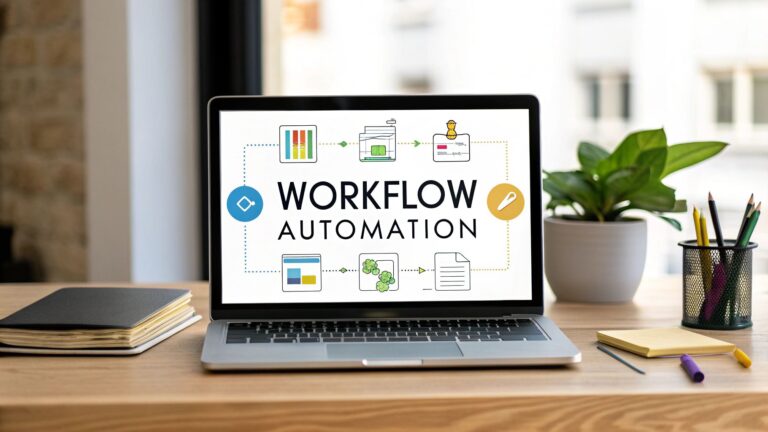12 Best HR Software for Startups in 2025: A Founder’s Guide
For early-stage founders, the jump from spreadsheets to dedicated HR software is a critical growth milestone. It's not just about payroll; it's about building a scalable foundation for hiring, onboarding, and compliance that frees you up to focus on your product and customers. Choosing the wrong system can lead to costly migrations, compliance headaches, and a frustrating employee experience. This guide cuts through the noise, providing a founder-focused analysis of the 12 best HR software for startups.
We'll examine each platform's ideal use case, from managing your first few US-based employees to hiring globally, so you can make a choice that supports your team today and scales with your ambitions for tomorrow. Inside, you'll find detailed breakdowns of platforms like Gusto, Rippling, and Deel, complete with screenshots, direct links, and honest assessments of their limitations. We'll dive into practical implementation considerations and highlight specific features that solve real startup challenges. Our goal is to equip you with the insights needed to select a system that streamlines operations, not complicates them.
To give you a broader perspective on available tools, you can also explore other top HR software solutions for small businesses that cater to different operational needs and company sizes. Let's find the right HR platform to fuel your growth.
1. Gusto
Gusto stands out as one of the best HR software for startups due to its all-in-one platform that masterfully combines payroll, benefits, and foundational HR. It’s particularly strong for early-stage companies that need to establish compliant payroll and benefits administration quickly across all 50 U.S. states. Its user-friendly interface simplifies complex tasks for both administrators and employees, making it a go-to choice for founders without a dedicated HR team.
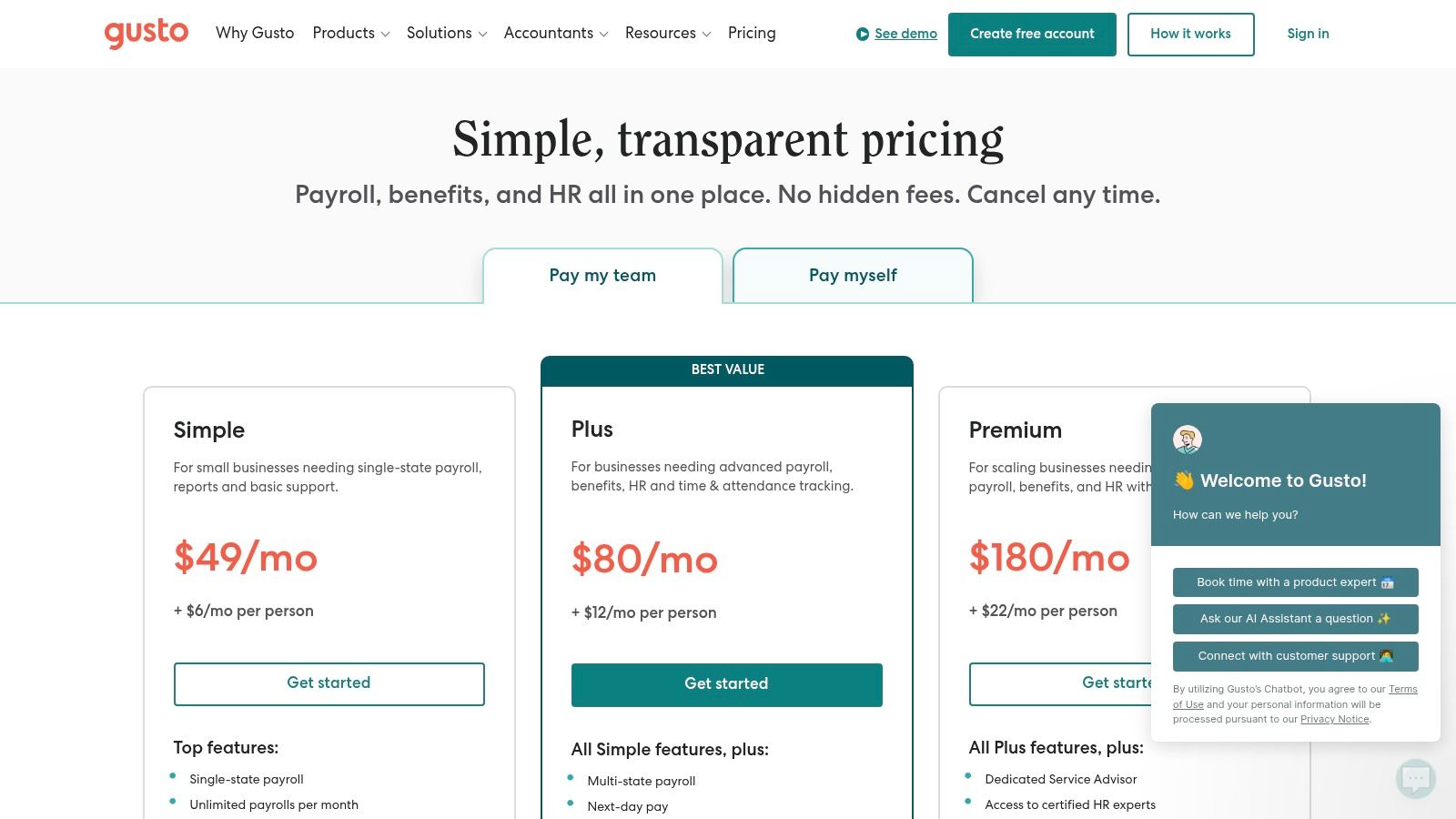
The platform’s strength lies in its scalability, effortlessly growing from managing a handful of contractors to a full team of W-2 employees. Gusto's transparent, month-to-month pricing is a major advantage for startups managing tight budgets. It provides essential tools for automated payroll tax filings, time tracking, and new-hire onboarding, which helps create a seamless experience from day one. You can explore a deeper dive into modern onboarding strategies to complement Gusto's features by reviewing some employee onboarding best practices.
Key Details
- Best For: Early-stage startups needing a user-friendly, all-in-one payroll and benefits solution.
- Pricing: Starts at $40/month + $6 per person. Plans scale up to include more advanced HR tools and support.
- Pros: Exceptionally easy to use, clear public pricing, and excellent for multi-state payroll compliance.
- Cons: Advanced HR support and features are locked behind higher-priced tiers, and per-employee costs can add up as the team grows.
- Website: https://gusto.com/
2. Rippling
Rippling earns its place as one of the best HR software for startups by uniquely unifying HR with IT management. It’s an ideal solution for tech-forward companies that want to automate employee onboarding and offboarding across both human resources and technology systems from day one. By connecting payroll, benefits, devices, and apps, Rippling creates a single source of truth that drastically reduces administrative overhead for lean teams.
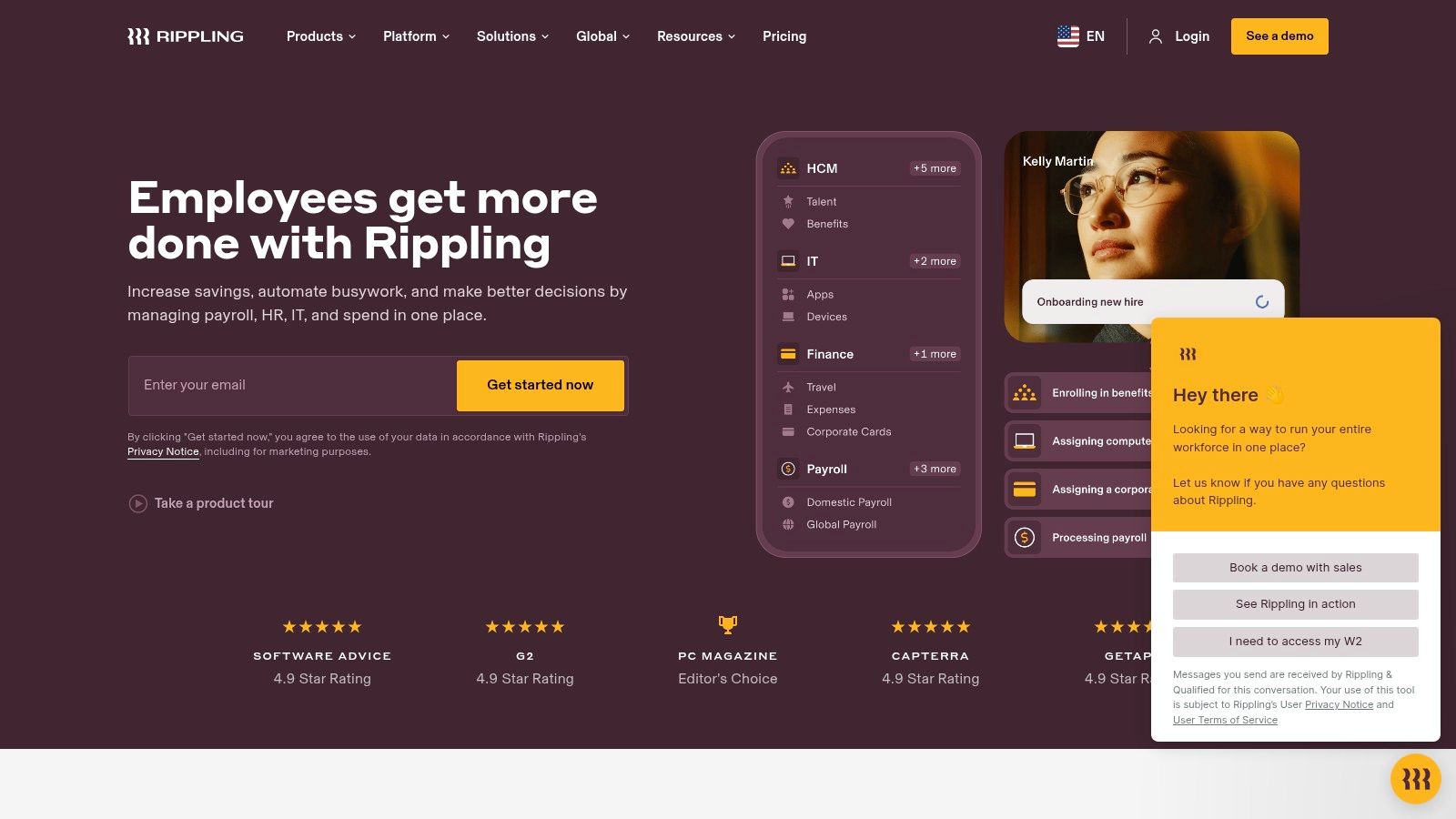
The platform’s core strength is its modularity, allowing startups to purchase only the features they need and add more as they scale. This "build-your-own" approach is cost-effective initially, while its powerful workflow engine enables deep automation for everything from provisioning software access to ordering a new hire's laptop. With over 500 integrations, Rippling serves as a central hub, preventing the tool sprawl common in fast-growing companies and streamlining operations significantly.
Key Details
- Best For: Startups needing a unified HR and IT platform to automate employee lifecycle management.
- Pricing: Starts at $8 per user/month; custom quotes are required as costs vary based on selected modules.
- Pros: Deep automation saves significant admin time, a single system for HR and IT reduces tool sprawl, and its modular design keeps early costs low.
- Cons: Pricing is less transparent than competitors and can become complex, while implementation can be more intensive than simpler payroll-focused tools.
- Website: https://www.rippling.com/
3. BambooHR
BambooHR has earned its place as one of the best HR software for startups ready to graduate from spreadsheets. It provides a clean, centralized HR information system (HRIS) that excels at managing employee data, from hiring to offboarding. The platform is especially valuable for growing startups that need to formalize their HR processes without overwhelming a small team, offering powerful tools for applicant tracking, onboarding, and performance management.
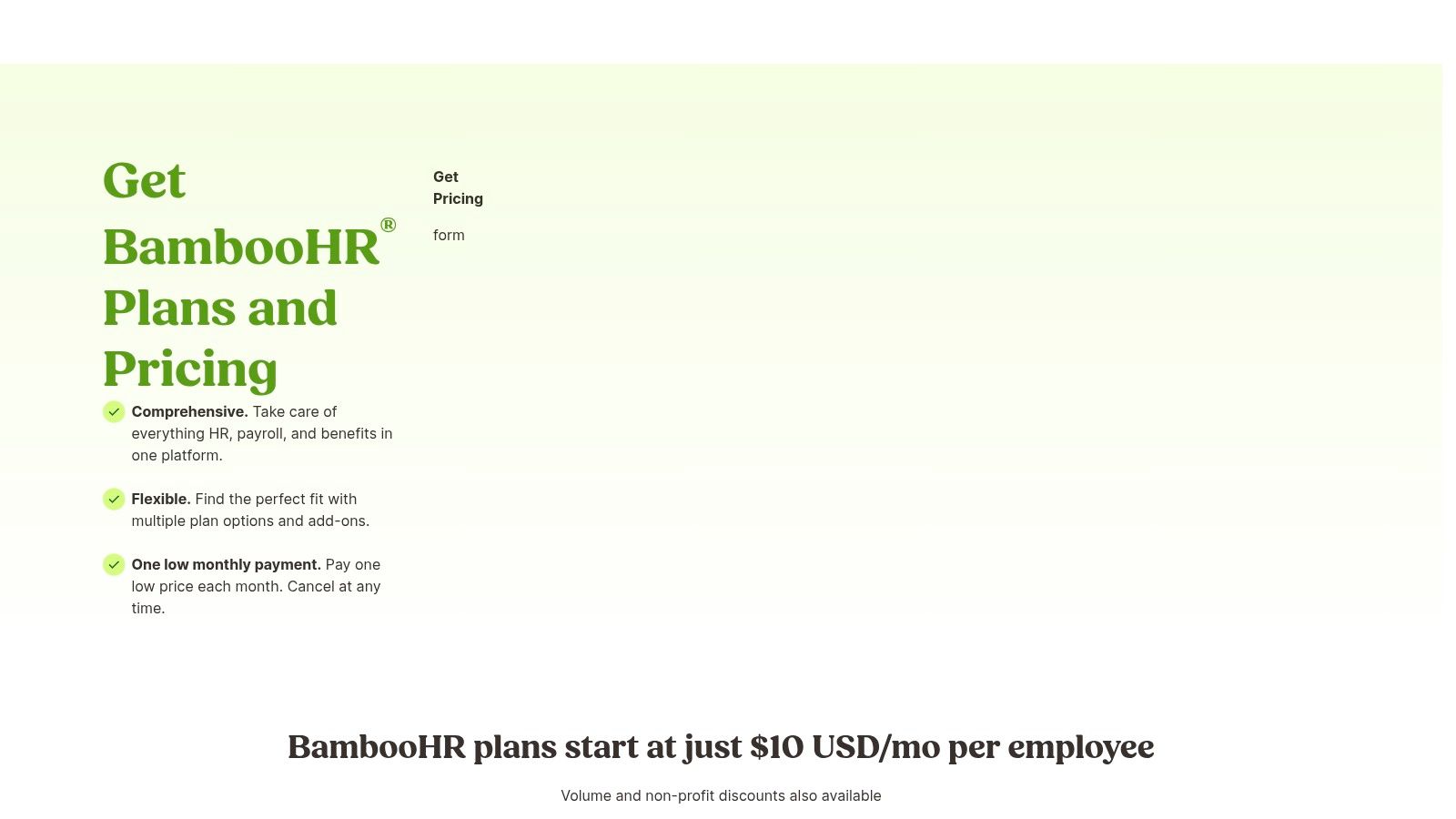
The platform’s core strength is its comprehensive yet intuitive design, making it easy for first-time HR managers to navigate. It centralizes employee records, automates workflows, and provides insightful analytics to inform better people decisions. With optional add-ons for U.S. payroll and benefits, BambooHR scales effectively as a startup’s needs become more complex. For a closer look at the hiring tools it offers, you can explore key applicant tracking system features.
Key Details
- Best For: Startups transitioning from manual processes to their first dedicated HR system.
- Pricing: Quote-based; requires contacting sales. Two main packages are offered (Essentials and Advantage).
- Pros: Highly intuitive for new HR administrators, offers broad HR feature coverage, and provides nonprofit discounts.
- Cons: Lacks transparent public pricing, and the total cost increases with necessary add-ons and higher-tier features.
- Website: https://www.bamboohr.com/pricing/
4. Deel
Deel solidifies its place as one of the best HR software for startups by making global hiring accessible and compliant from day one. It is an indispensable tool for modern, remote-first companies that need to hire international employees or contractors without establishing local legal entities. Deel’s Employer of Record (EOR) service handles local payroll, benefits, and compliance in over 150 countries, removing the most significant barrier to building a distributed team.
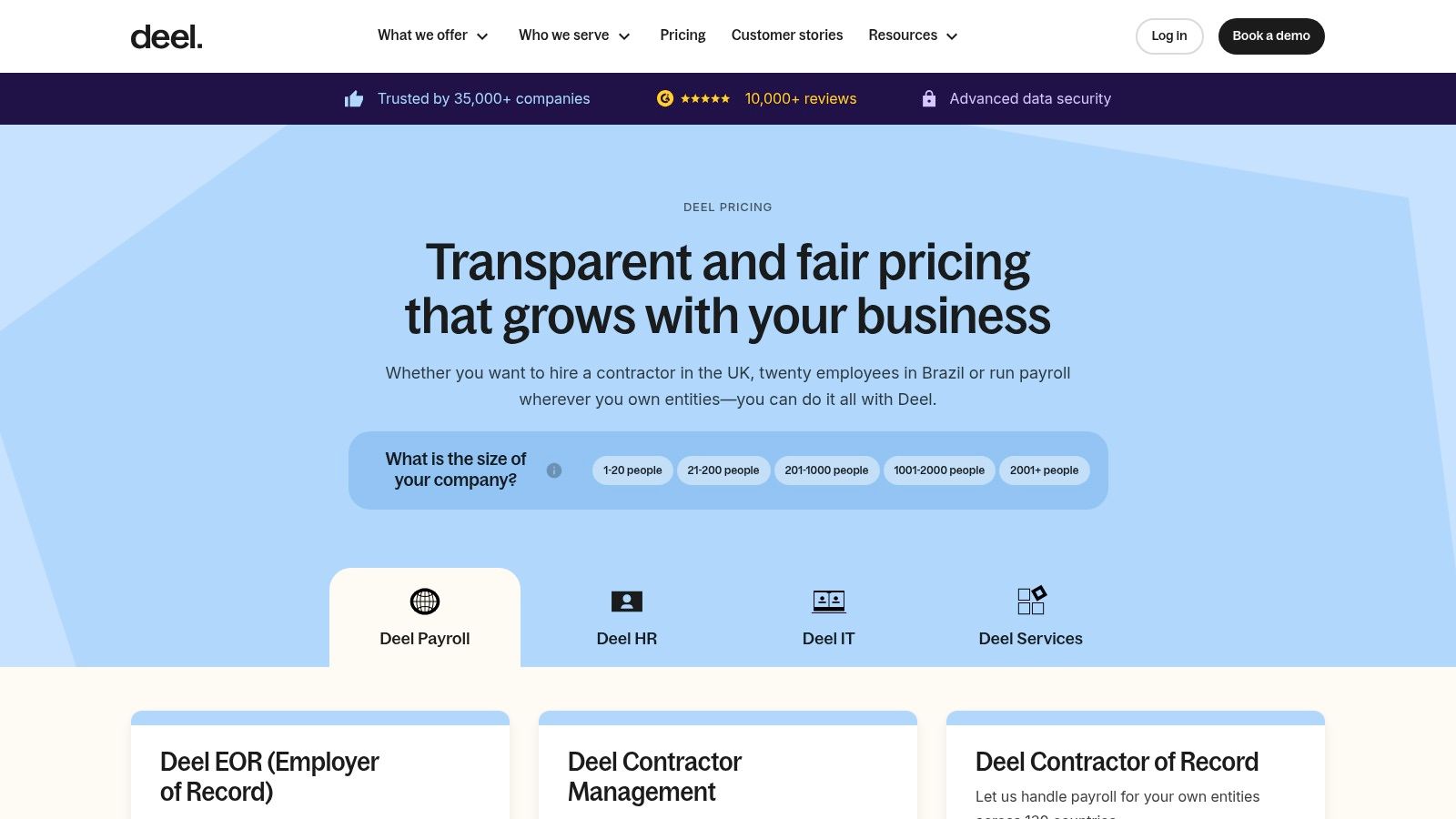
The platform’s core strength is its ability to manage both full-time international employees and global contractors through a single interface. This unified approach simplifies payments, contract generation, and tax documentation, allowing startups to scale their global workforce seamlessly. For those evaluating how Deel fits into a broader talent acquisition strategy, you can get a better understanding by exploring this recruitment software comparison. Deel's transparent pricing and powerful automation make it a clear choice for founders looking to compete for talent on a global scale.
Key Details
- Best For: Startups hiring internationally and needing a compliant EOR and contractor management solution.
- Pricing: EOR starts at $599 per employee/month. Contractor management starts at $49 per contractor/month.
- Pros: Fast international onboarding without establishing entities, transparent EOR and contractor pricing published, and scales from one contractor to global teams.
- Cons: EOR per-employee fees can add up compared to local payroll, and some HR features are focused on global coverage rather than deep domestic HR.
- Website: https://www.deel.com/pricing?utm_source=openai
5. Justworks
Justworks operates as a Professional Employer Organization (PEO), making it one of the best HR software for startups that want to offload compliance risks and access enterprise-grade benefits. It bundles payroll, benefits, HR tools, and compliance support into a single, predictable per-employee per-month price. This model is ideal for founders who prefer hands-on support and want to outsource the complexities of employment regulations, workers' compensation, and benefits administration.
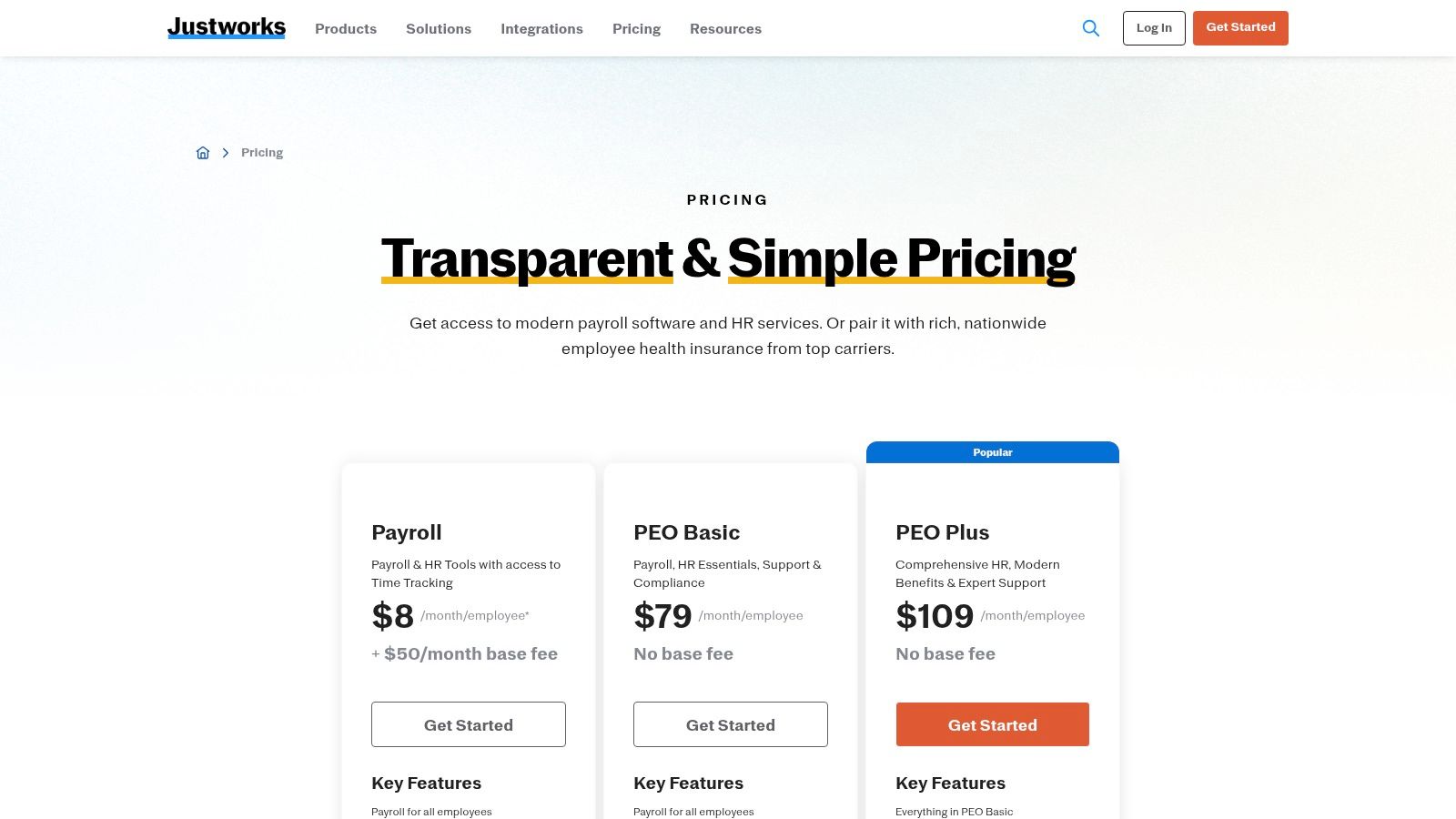
The platform’s core strength is providing small businesses access to big-company benefits at more competitive rates. Justworks handles critical HR functions like payroll processing, tax filings, and new hire reporting, all backed by 24/7 expert support. While the PEO model may be more than what very small teams need, it becomes invaluable as a startup scales and its compliance obligations grow, particularly when hiring across multiple states.
Key Details
- Best For: Startups wanting the comprehensive support of a PEO for benefits, payroll, and compliance management.
- Pricing: Starts at $59/month per employee for Basic and $99/month per employee for Plus, with price breaks for teams over 50.
- Pros: Simple, transparent pricing for PEO services, strong compliance support, and no PEO implementation fees.
- Cons: The PEO model may be unnecessary for very early-stage startups, and add-ons for time tracking or global contractors cost extra.
- Website: https://www.justworks.com/pricing?utm_source=openai
6. RUN Powered by ADP
RUN Powered by ADP earns its spot as one of the best hr software for startups for founders who prioritize brand recognition and deep compliance experience. This platform is ADP’s dedicated solution for small businesses, offering robust payroll, tax filing, and tiered HR support. It stands out by leveraging ADP's decades of industry leadership and providing access to an extensive partner ecosystem, which is ideal for startups wanting to integrate HR with other business tools from a well-established provider.
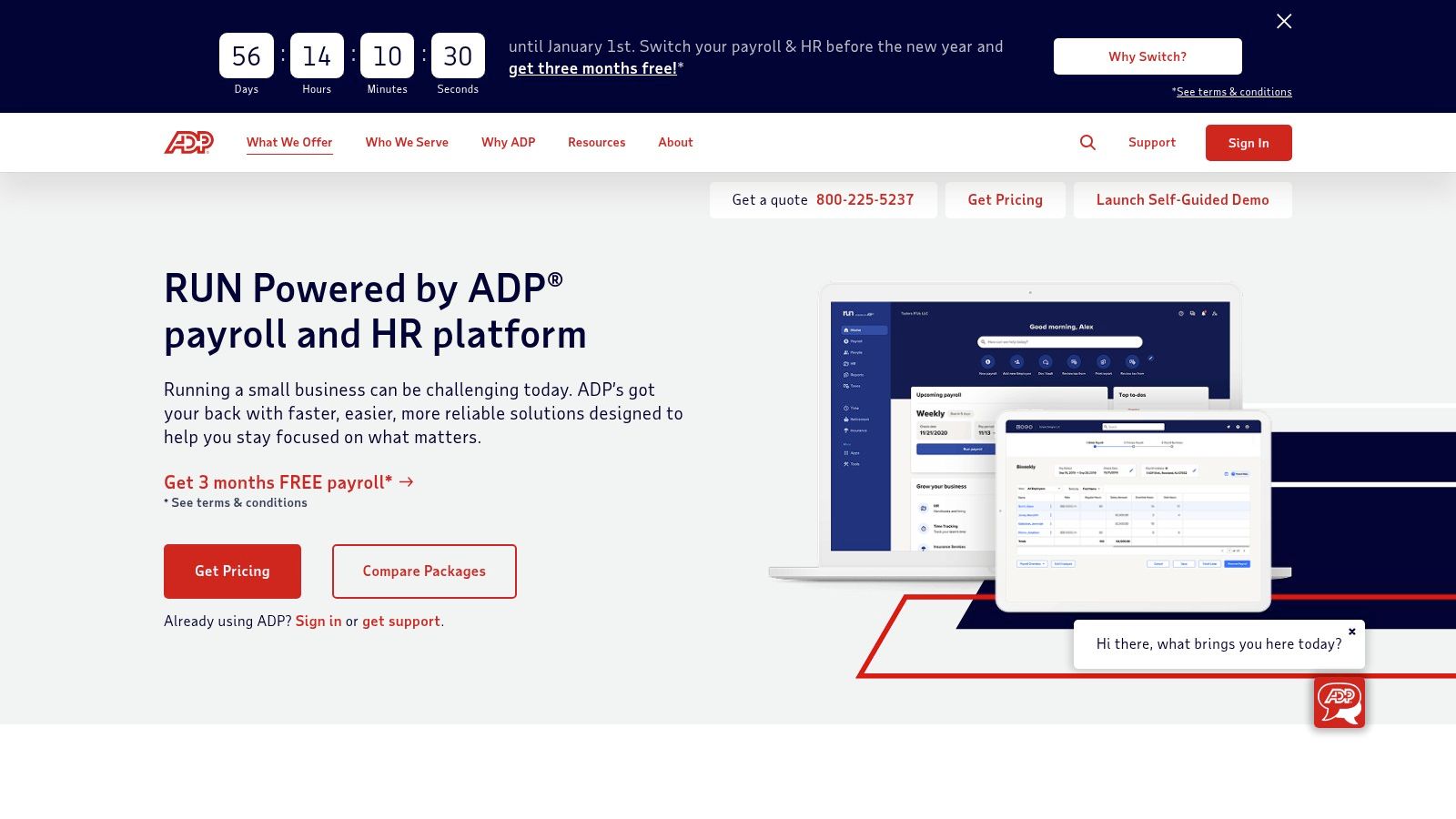
The platform is built around automated payroll and tax compliance, ensuring startups can manage this critical function accurately from day one. Its true power lies in its scalability and customization through the ADP Marketplace, which allows companies to add specialized tools for recruiting, time tracking, and benefits administration as they grow. This à la carte approach allows a startup to build a custom HR stack on a proven foundation, backed by 24/7 support.
Key Details
- Best For: Startups that prefer the security of an established provider and need access to a large marketplace of integrated apps.
- Pricing: Quote-based only; pricing varies by package and add-ons selected.
- Pros: Deep ecosystem and compliance experience, scales with tiers and add-on marketplace tools, and strong support availability.
- Cons: RUN pricing is not transparent and requires a sales call, and costs can increase significantly as you add necessary features.
- Website: https://www.adp.com/what-we-offer/products/run-powered-by-adp.aspx?utm_source=openai
7. Paychex Flex
Paychex Flex is a long-standing player in the HR and payroll space, offering a highly scalable solution that can serve a startup from its inception as a sole proprietorship through significant growth. It stands out by providing an extensive, bundled service catalog that allows founders to pick and choose modules for payroll, time tracking, benefits, and even retirement plans. This makes it one of the best HR software for startups that anticipate needing a single vendor to handle an expanding list of HR complexities over time.
The platform is designed to grow with a business, offering everything from basic online payroll with automated tax filing to more comprehensive Professional Employer Organization (PEO) services. While its interface may feel more traditional than some modern competitors, its mobile app offers solid functionality for employees and managers on the go. The ability to add specialized support and features like payroll protection provides an extra layer of security for scaling companies navigating compliance and financial management for the first time.
Key Details
- Best For: Startups that want a single, scalable vendor for payroll, benefits, and HR that can grow with them.
- Pricing: Quote-based only; requires contacting sales to build a custom package.
- Pros: Broad service catalog under one vendor, works for sole proprietors through SMBs, and allows for adding services as needed.
- Cons: Pricing is not transparent and bundles can be complex to navigate; advanced features often require higher-tier plans.
- Website: https://www.paychex.com/payroll
8. Namely
Namely is designed as a modern HR platform for growing mid-sized businesses, making it one of the best HR software for startups ready to scale past the initial stage. It offers a modular approach, allowing companies to combine core HR, payroll, benefits, and talent management features as needed. This flexibility is ideal for startups that have graduated from basic payroll and are now focused on building culture and performance management systems.
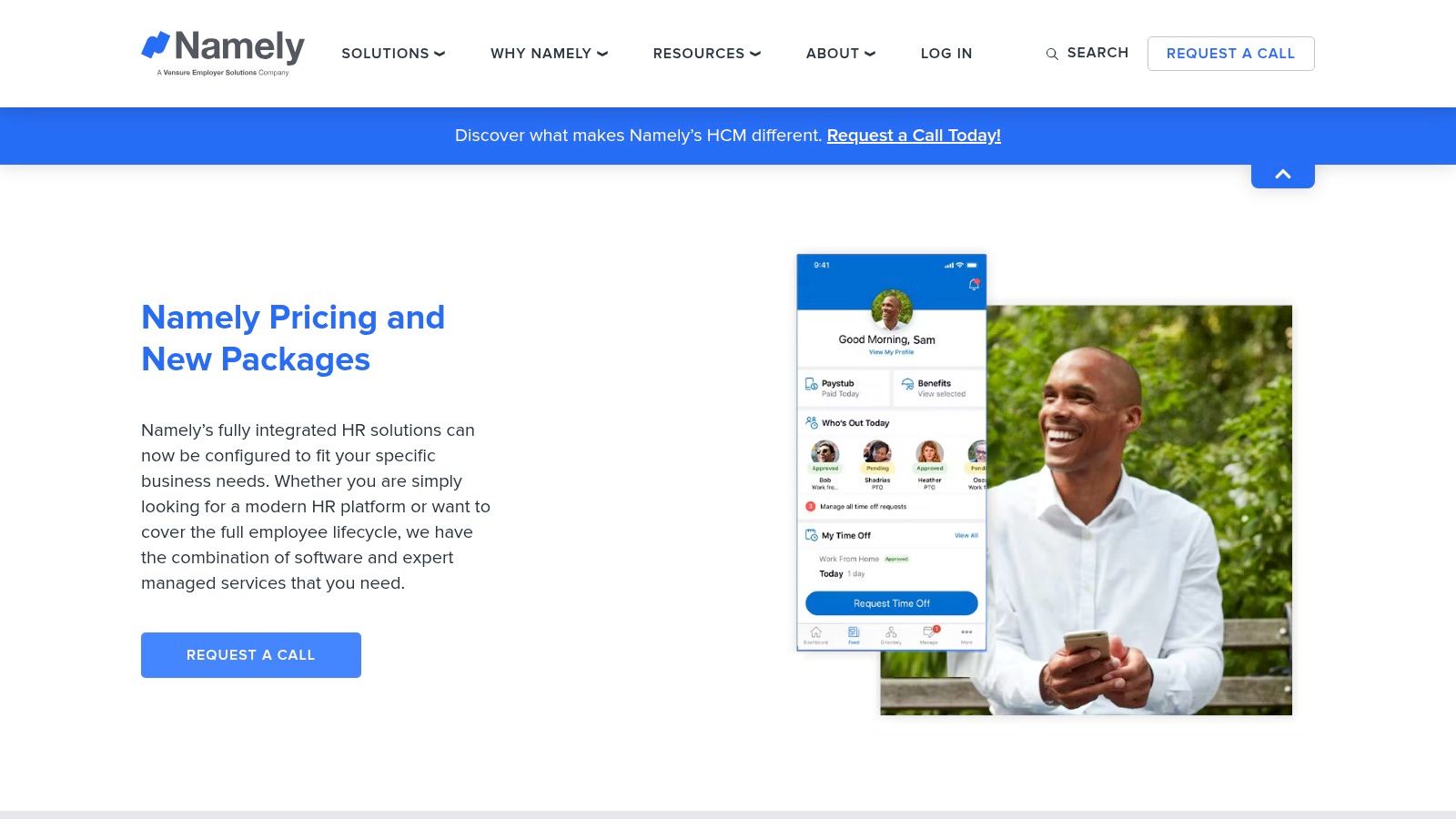
The platform’s key differentiator is its optional managed services for payroll and benefits, which provide white-glove support for complex administrative tasks. This creates a clear growth path within a single system, letting a startup add expert help without switching providers. While it can serve smaller teams, Namely hits its stride with companies between 25 and 500 employees that require a more robust, configurable HR infrastructure to support their expansion.
Key Details
- Best For: Scaling startups (25+ employees) needing a configurable platform with options for managed payroll and benefits.
- Pricing: Custom-quoted based on modules and services needed; pricing is most competitive for mid-sized teams.
- Pros: Highly modular and configurable, offers a clear upgrade path to managed services, and has strong performance management tools.
- Cons: Pricing is not fully transparent and is generally better suited for teams of 25 or more, not very early-stage startups.
- Website: https://www.namely.com/lp/pricing/
9. HiBob (Bob)
HiBob, often called Bob, positions itself as the best HR software for startups ready to scale into the mid-market. It offers a people-first HRIS with a modern, engaging user experience that drives high employee adoption. The platform excels in unifying core HR, performance management, and compensation planning, making it ideal for venture-backed companies that need a robust, global-ready solution to manage a growing, often hybrid, workforce.
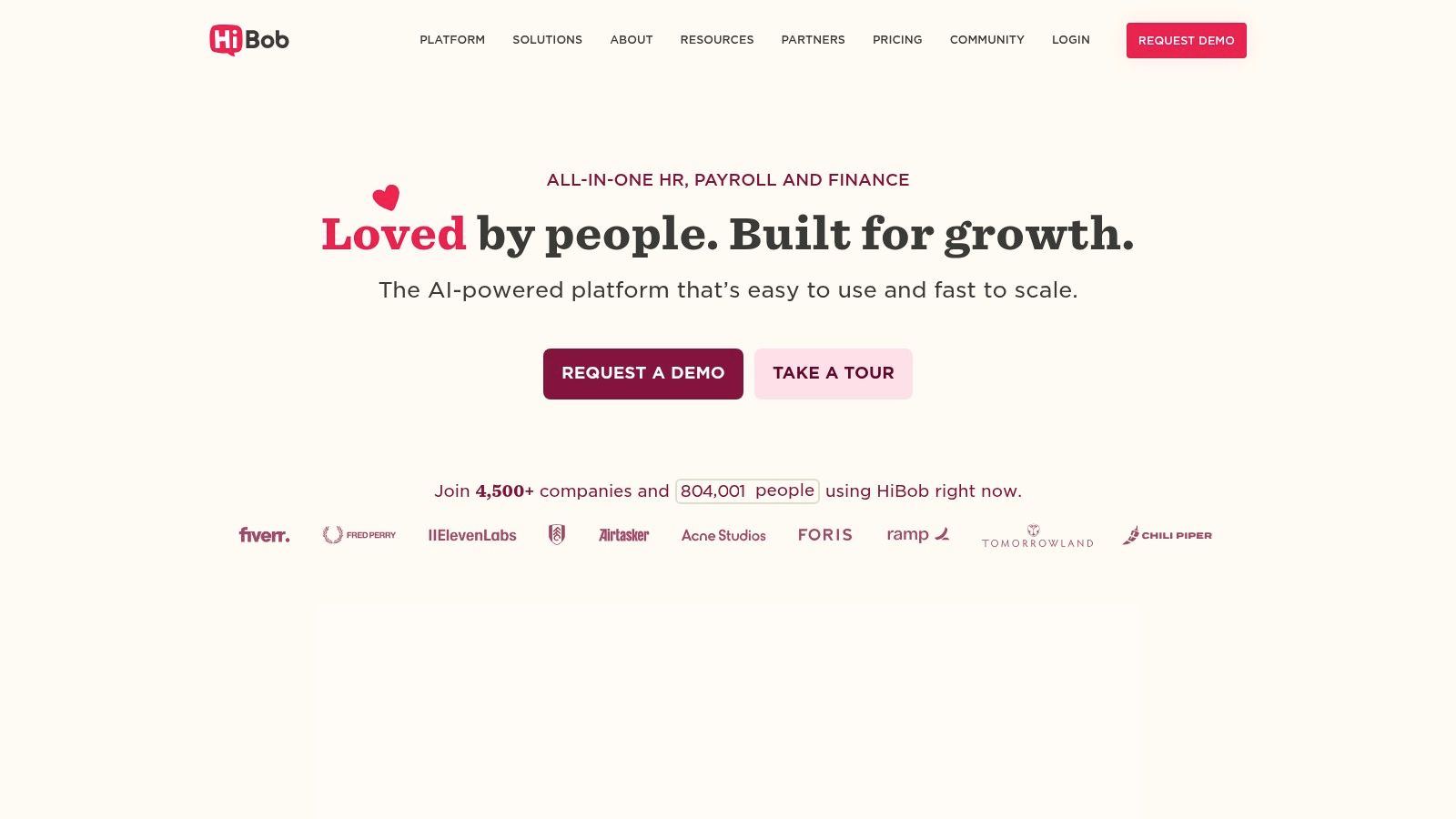
Unlike lightweight tools focused solely on payroll, Bob’s strength is in fostering culture and engagement through features like its social-media-style homepage, clubs, and shoutouts. It provides powerful people analytics and recently introduced an AI companion to streamline HR workflows and deliver deeper insights. The platform’s ability to integrate with payroll and IT systems allows startups to build a cohesive tech stack as they expand internationally, without sacrificing a great employee experience.
Key Details
- Best For: Scaling startups and mid-market companies needing a global HRIS with strong engagement and analytics features.
- Pricing: Custom quote-based pricing. Not publicly available and typically higher than introductory SMB tools.
- Pros: Modern UI drives high employee adoption, excellent for engagement and people analytics, and scales effectively for global and hybrid teams.
- Cons: Pricing is not transparent and can be a significant investment for early-stage companies.
- Website: https://www.hibob.com/
10. Zoho People
Zoho People is a strong contender for the best HR software for startups, especially for those already integrated into the Zoho ecosystem. It offers a modular and highly affordable HR suite that covers core functions like employee data management, attendance, leave tracking, and performance reviews. Its key advantage is its ability to grow with a company, starting with a free plan for up to five employees and scaling with transparently priced tiers.
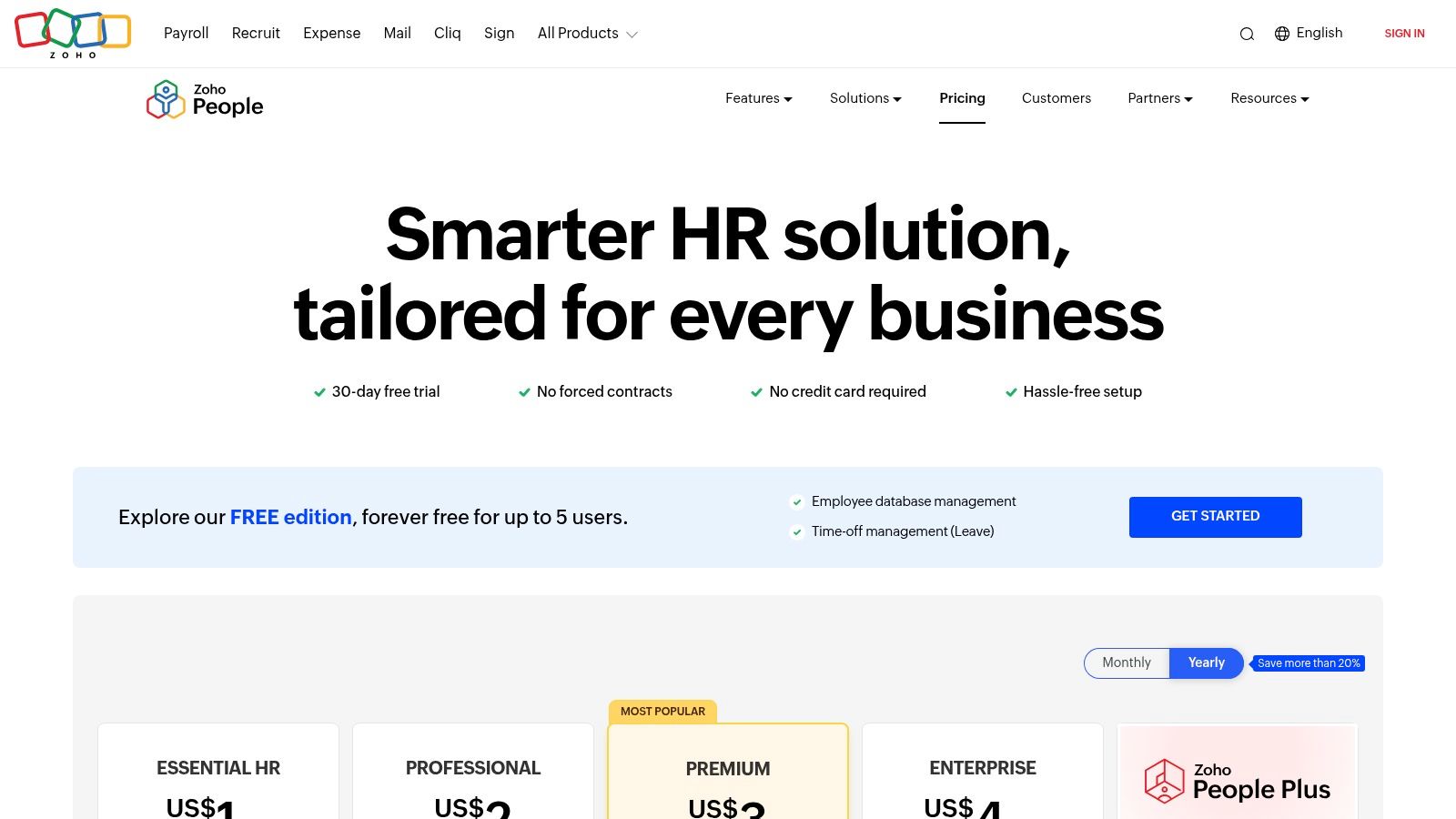
The platform shines for budget-conscious startups that need a centralized system for HR administration without a hefty price tag. Seamless integrations with other Zoho products (like Recruit, CRM, and Expense) and third-party apps like Google Workspace create a unified operational workflow. This makes it an incredibly practical choice for businesses looking to streamline processes by connecting HR data with other critical business functions, from recruitment to finance.
Key Details
- Best For: Budget-conscious startups, especially those already using other Zoho applications.
- Pricing: A free plan is available for up to 5 users. Paid plans start at just $1.25 per user/month.
- Pros: Highly affordable and transparent pricing, a generous free tier for small teams, and powerful integration within the Zoho suite.
- Cons: The user interface can feel less modern than competitors, and advanced analytics and premium support are reserved for higher-priced plans.
- Website: https://www.zoho.com/people/zohopeople-pricing.html?utm_source=openai
11. G2
While not an HR platform itself, G2 is an indispensable resource for any founder researching the best HR software for startups. As a leading software marketplace, it offers a massive database of verified user reviews, detailed comparison grids, and real-time rankings. This allows startups to vet potential HR tools by filtering for company size, specific features, and user satisfaction, ensuring they shortlist solutions that are genuinely effective for their unique stage and needs.
G2’s strength lies in its crowd-sourced feedback, which provides an unbiased look into a platform's actual performance, customer support quality, and ease of implementation. For startups, this is a powerful way to cut through marketing noise and understand how a tool functions in a real-world small business environment. By leveraging its comparison grids and "Core HR for Small Business" category, you can make a data-driven decision without costly trial-and-error.
Key Details
- Best For: Startups in the research phase looking to compare HR software based on verified user reviews and specific business needs.
- Pricing: Free to use for research and comparisons.
- Pros: Provides current, crowdsourced user feedback, enables easy side-by-side software comparisons, and links directly to vendor trials and pricing pages.
- Cons: Vendors may incentivize reviews, so it's wise to read a variety of entries. Rankings can also shift frequently based on new feedback.
- Website: https://www.g2.com/categories/core-hr/small-business?utm_source=openai
12. GetApp
While not a direct HR platform, GetApp serves as an invaluable research hub, making it a strategic first stop for finding the best HR software for startups. This Gartner-owned comparison site offers curated lists, pricing snapshots, and user-generated reviews, helping founders discover and vet potential solutions. Its strength lies in its comprehensive filters, allowing you to narrow down options by specific features, company size, and integration capabilities, which is perfect for identifying niche or budget-friendly tools you might otherwise overlook.
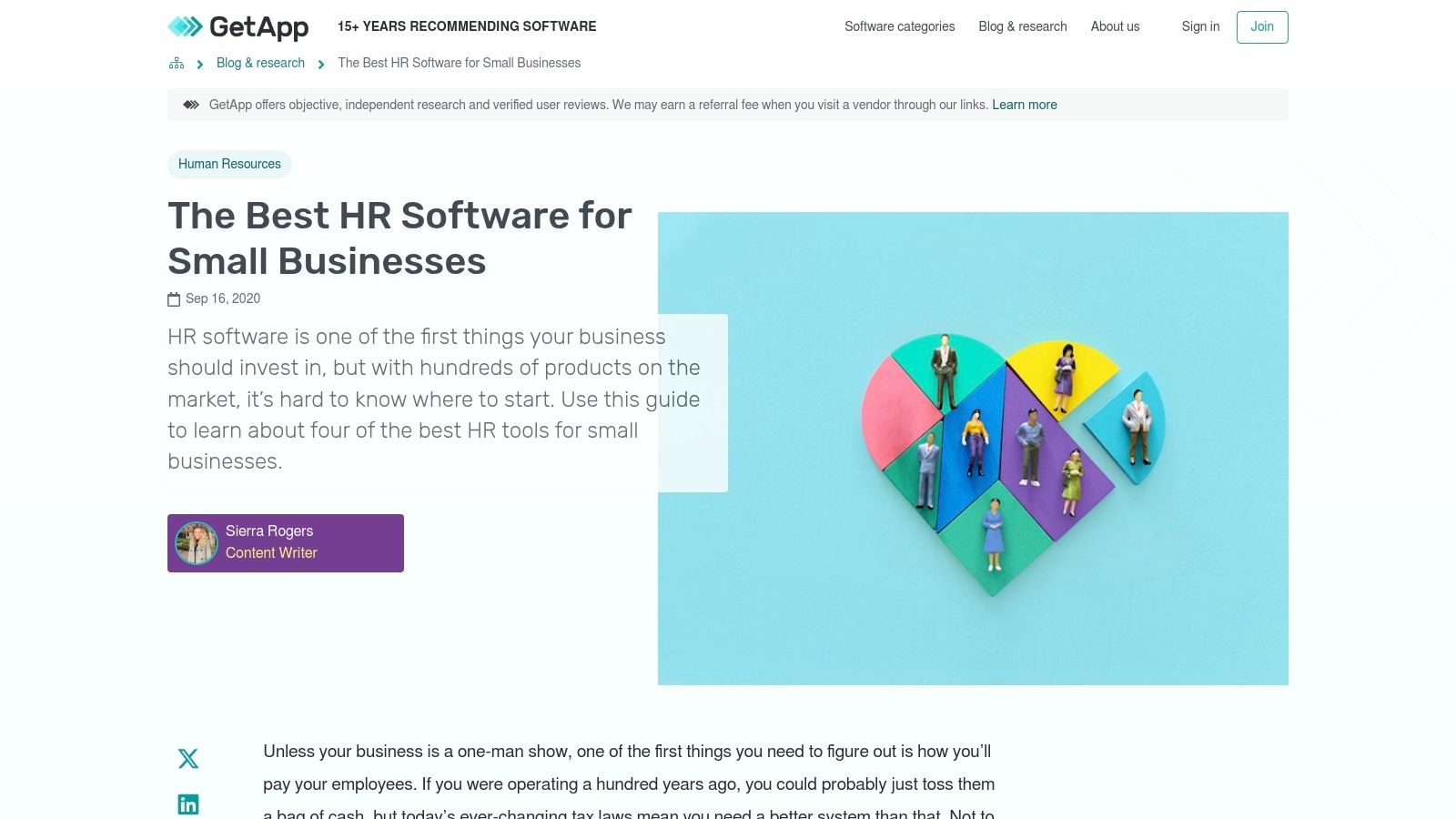
GetApp’s "Category Leaders" reports and editorial guides provide a data-backed starting point for your shortlist, saving you hours of manual research. For startups, the ability to quickly compare pricing models and access free trial links from a single dashboard is a significant advantage. It's an essential resource for making an informed decision before committing to a specific vendor, ensuring your chosen software aligns perfectly with your startup's unique operational needs and budget constraints.
Key Details
- Best For: Startups in the research phase looking to compare HR software options based on features, pricing, and real-user reviews.
- Pricing: Free to use for research and comparison.
- Pros: Excellent for discovering lesser-known, low-cost tools, provides quick pros/cons and pricing notes, and offers independent guides to help create a shortlist.
- Cons: Some listings may be sponsored, so always validate details on vendor websites. Coverage can be US-centric, requiring extra verification for international needs.
- Website: https://www.getapp.com/resources/hr-software-for-small-business/?utm_source=openai
Top 12 HR Software for Startups: Features & Pricing Comparison
| Product | Core capabilities | Best for | Key differentiator | Pricing & value |
|---|---|---|---|---|
| Gusto | Payroll + tax filings, benefits, onboarding, time/PTO (tiers) | Early-stage US teams needing simple payroll | Clear public pricing, month-to-month, beginner-friendly UX | Transparent pricing; PEPM add-ons on higher tiers |
| Rippling | HRIS, payroll, time, app/device provisioning, 500+ integrations | Startups needing unified HR + IT automation | Device/app provisioning + deep custom automations | Modular pricing; cost varies by selected modules (less transparent) |
| BambooHR | Employee records, ATS, onboarding, performance, analytics | SMBs moving from spreadsheets to a formal HR system | Intuitive UI with strong hiring/onboarding tools | Quote-based pricing; add-ons increase total cost |
| Deel | Global EOR, contractor management, payroll, benefits (150+ countries) | Companies hiring internationally without local entities | Fast EOR onboarding with local compliance and payments | Published EOR/contractor pricing; EOR PEPM fees can add up |
| Justworks | PEO, payroll, benefits admin, compliance support, 24/7 help | Startups wanting predictable PEO + hands-on support | Simple published PEO tiers and strong support reputation | Published PEO pricing; add-ons (time, intl contractors) cost extra |
| RUN (ADP) | Payroll, tax filing, tiered HR support, large integrations ecosystem | Founders preferring an established provider and marketplace | Deep compliance experience and ADP Marketplace integrations | Quote-based pricing; add-ons and marketplace tools raise cost |
| Paychex Flex | Payroll, tax filing, time, benefits, retirement, optional PEO | Very small teams up through larger SMBs needing broad services | Wide service catalog and specialist support options | Quote-based; bundle complexity but scalable as you grow |
| Namely | Core HR, payroll, benefits, performance, managed services | Growing SMBs wanting modular HR + white-glove options | Layerable managed services with HR-first packages | Published entry pricing for HR packages; final cost varies by config |
| HiBob (Bob) | HRIS, onboarding, performance, compensation planning, people analytics | Venture-backed startups scaling globally / hybrid teams | Modern UX, strong engagement & people analytics, AI companion | Custom pricing; typically higher PEPM than lightweight tools |
| Zoho People | Core HR, leave/attendance, onboarding, performance, API | Budget-conscious startups and Zoho ecosystem users | Transparent low pricing, free plan, tight Zoho integrations | Low, transparent pricing + 30‑day trial; free tier for very small teams |
| G2 | Verified reviews, rankings, comparison grids, buyer guides | Shortlisting and vetting HR tools via user feedback | Crowdsourced, current user feedback and filterable comparisons | Free to use; links to vendor trials and pricing |
| GetApp | Curated HR software lists, pricing snapshots, filters, guides | Discovering budget options and aggregated reviews | Editorial guides, pricing callouts, category leader insights | Free to use; verify sponsored listings and regional fit |
Automate HR, Accelerate Growth
Selecting the right HR platform is one of the most impactful decisions a startup founder can make. It's a foundational choice that influences everything from team morale and operational efficiency to legal compliance and your ability to scale. We've explored a range of powerful options, from all-in-one solutions like Gusto and Rippling that simplify payroll and benefits, to globally-focused platforms like Deel that make hiring international talent seamless. The journey from a manual, spreadsheet-driven HR process to an automated, integrated system is a significant step toward sustainable growth.
The central takeaway is that there is no single "best" HR software for startups; there is only the best fit for your startup's unique stage, size, and strategic goals. Your choice should be a direct reflection of your company's immediate needs and future ambitions. By automating the routine, you empower your team to focus on the human element of HR: building culture, developing talent, and driving the business forward.
Making Your Final Decision
As you move from evaluation to implementation, keep these critical factors in mind to ensure you choose a partner, not just a product:
- Scalability: Does the software's pricing and feature set grow with you? Avoid platforms with prohibitive costs at the next tier or that lack the advanced capabilities you'll need in 12-24 months.
- Integration Ecosystem: Your HR software doesn't exist in a vacuum. Assess its ability to connect with your existing tech stack, such as accounting software, project management tools, and communication platforms, to create a truly unified operational hub.
- Employee Experience: The best system is one your team will actually use. Prioritize a clean, intuitive, and mobile-friendly user interface that empowers employees to manage their own information, from PTO requests to benefits enrollment, without friction.
- Implementation and Support: A smooth onboarding process is non-negotiable. Investigate the provider's implementation support, data migration assistance, and the ongoing quality of their customer service. A great tool with poor support can quickly become a major liability.
For startups aiming to build a truly strategic workforce, integrating your core HR system with specialized tools is the next frontier. For comprehensive insights into workforce planning and strategic hiring, exploring dedicated talent intelligence software can provide significant advantages by offering deeper data on market trends and competitor hiring.
Ultimately, the best HR software for your startup is the one that removes administrative burdens and transforms your people operations into a strategic asset. By making a thoughtful, forward-looking choice, you are not just buying software; you are investing in a more efficient, compliant, and people-focused future for your company, setting the stage for accelerated growth.
Ready to connect your new HR software with the rest of your tech stack? MakeAutomation helps you build powerful, codeless integrations and workflows between your HR platform and hundreds of other applications. Automate your entire employee lifecycle, from onboarding in your project management tool to data syncs with your finance software, using our intuitive drag-and-drop builder at MakeAutomation.






